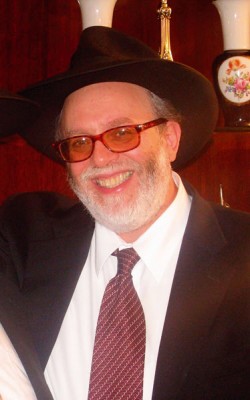
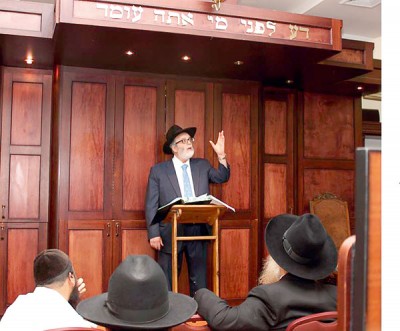
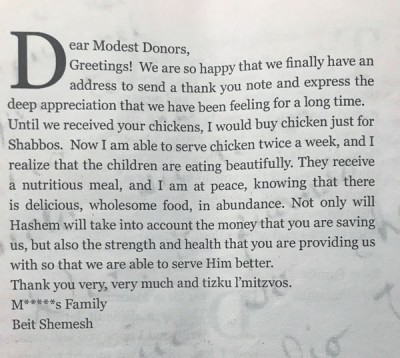
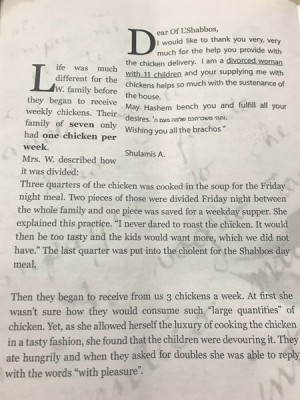
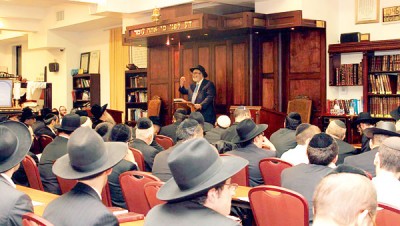
An Interview With Robbie Neuman, The Energy And Voice Behind Chickens For Shabbos
Who is like the Jewish people, who stand up for each other and support one another? There are so many Jewish charity organizations that the word “charity” is almost synonymous with Judaism. Unfortunately, many of our brothers and sisters struggle daily. What the average person takes for granted, they consider a luxury. However, the heart of a Jew knows no limits. We have men and women amongst us who make it their life’s mission to help all those feeling the pains of deprivation. I am therefore extremely proud, and delight in the opportunity to present an interview of one of the foremost Jewish charities in the world. Please join me for a discussion with Chickens for Shabbos’ Robbie Neuman about the unbelievable miracles and kindnesses taking place amongst our people on a day-to-day basis.
BJL: Chickens for Shabbos has become a world-renowned charity with a legendary legacy in Queens. How does it sustain itself and continue to fight poverty all around the Jewish world?
RN: The main base of Chickens for Shabbos is here in Kew Gardens Hills, where it all started approximately 12 years ago. I would of course be remiss not to mention all those who made it happen. The first to thank is HaKadosh Baruch Hu (G-d). You need to understand that this charity is an absolute miracle. From inception to current operations, the charity carries no overhead–none whatsoever! Only a miracle can sustain such a charity without any expenses.
BJL: What do you mean? Doesn’t the charity have a central office or organization managing it?
RN: We have no such thing [Robbie beams]. Go look in the phonebook; Chickens for Shabbos has no office number. To contact someone from the charity, you would need to call the Young Israel of Kew Gardens Hills and they would connect you to Chickens for Shabbos. The real organization is the people of Kew Gardens Hills who participate in this tzedokeh (charity) and make it happen. They gave the money that built the tzedokeh and keeps it running.
There are also vital people who go around collecting week by week, and they deserve special mention. This list includes Rabbi Yossi Hoch and his sons Ari and Nechemia; Bernie Shafran, who is always available when we need him; Simcha Naimark; Mr. Kesherim; and Mr. Jacobs, who all expend tremendous
effort.BJL: Please tell our readers about the extent of operations. To whom and how does Chickens for Shabbos distribute aid?
RN: As the name suggests, Chickens for Shabbos began by distributing chickens for faltering families. We spread about $5 million worth of chickens around, but we aren’t involved in that anymore. A few things have changed. First of all, the families that we specialize include are melamdim (Torah scholars), for whom we spend about $45,000 a month.
BJL: Where do these melamdim live?
RN: The amount mentioned is given to melamdim in Israel and excludes the melamdim we support in America. In fact, in Queens alone, we give thousands a month for melamdim and their families. We have 300 such families in Israel.
We also support 120 families of women who are divorced or agunot (women whose husbands abandon but refuse to legally divorce). We arrange for private tutoring of their approximately 220 children so that they shouldn’t flunk out of yeshiva because their fathers refuse to learn with them. We spend over $75,000 to tutor these children. We also provide for therapy for these children and scholarships for their yeshivos. We also provide food, blankets, heaters, etc.; we try to do whatever we can.
BJL: How did Chickens for Shabbos evolve from distributing chickens to where it is at today?
RN: I had a partner whose name was Shlomo Zalman Ellison, and he was good friends with Dovid Leib Cohn and Chaim Goldberg, who are excellent gabbei tzedokah. They led us to a lot of families, and we gave these families chickens for Shabbos once a month. We changed the diet to include produce because who can eat only chickens every day?
I decided to help melamdim because of a story I heard from Ariel Pinkhasov (of Meal Mart on Main St.) about a melamdim in yeshiva who intentionally hurt himself. This melamdim left over a note explaining that he did it because of his extreme poverty. Melamdim basically live from paycheck to paycheck and deal with enormous stress. We as Orthodox Jews owe everything to melamdim because without them we would have no religion. They are angels on earth who spend eight or nine hours a day studying Torah; their sole focus is spirituality.
BJL: Can you please tell our readers about the aid being sent to agunot?
RN: We do just about anything for these women, including financial support. Let me read you a letter about a divorced mother in Ofakim, Israel. This woman works hard to provide for her children. One night, we were notified that as she and her family are sitting home–their electricity got cut-off. She and her children were left in the dark and cold. Within four minutes of the notification, we arranged for her power to be turned back on. What happened is that the electric company installed a demeaning device in her home, which limited her electricity to the amount paid for in advance. This was in response to multiple failures to pay her bills. We promised this lady to provide funding for electricity for an entire year.
BJL: That’s remarkable. It must take special appreciation for Jewish souls to provide this level of aid.
RN: In a Jew is Hashem (G-d). The same Hashem that is in a Sephardi Jew is in a Yemenite Jew, an Ashkenazi Jew, and a Bukharian Jew. A Jew is a representation of all of us; in the soul of a single Jew is everybody. The greatest mitzvahs (commandments) in the world are taking away pain and giving pleasure. They will give you everything for just taking away the pain. What can we say to the soul that we could have helped after it is too late? If we have the opportunity, we need to help!
In this world G-d created those who have and those who don’t. G-d often pairs these people together so that someone who needs will always come to someone who has. In the next world, the one who needed will provide merit for the man who gave. In the merit of saving the poor man from pain, the poor man will testify to protect the one who gave from suffering.
Poverty causes unbelievable pain. The worry alone can cause a person to become paralyzed. The Talmud likens a destitute person’s situation to the deceased, who no longer have the strength to produce. It’s a wonder how women who have been abandoned even remain frum (religious). An agunah cannot remarry, she cannot go out; she is a women confined within her own walls.
BJL: How does Chickens for Shabbos connect with these women? How are you alerted to their dire straits?
RN: Our partner in this regard is the charity Yad Eliezer in Israel; these guys are amazing. As mentioned above, we cover the costs of the melamdim. Yad Eliezer hosts us on their website for no cost whatsoever. On its website, two of the donation tabs are owned by us: the agunos tab and the melamdim tab. We spend $15,000 a month supporting these women with food. Yad Eliezer not only hosts our webpage, but also gives $7,500 a month to make up the $15,000 we send in aid. This amount does not include the necessities we also provide such as blankets, clothing, tuition, and private tutoring.
BJL: Okay, so just to clarify, if one wants to donate, he needs to visit the Yad Eliezer website (yadeliezer.org) and click on the tab “Agunos, Grushos & Melamdim”?
RN: Yes, and hear this: Yad Eliezer does not charge us a penny! Not for running the website, not for the credit card fees, not for sending out receipts, and not for collecting the money. By the way, the second tab they host for is “Yizkor Donations.” We say kadish in the memory of the Jews who are requested for yizkor with the money that is donated through this tab.
I want to preface the next statement by saying that I have no words capable of adequately thanking Rabbi Fabian Schonfeld. He gave the first okay and all the money used to go through his shul. This charity is forever grateful to him and also his son, and also Rabbi Doniel Lander, Rosh Yeshiva of Yeshiva Ohr Hachaim, who also signed on to this tzedokeh. After that, it’s all these holy Jews in Kew Gardens Hills who gave the money. If not for them there is no money and without money there is no charity.
BJL: What is unique about the Jews of Kew Gardens Hills? Don’t funds come in from around the world?
RN: We have substantial donors here in Kew Gardens Hills, who started off the charity and continue to support it. The basis of the charity is in Kew Garden Hills.
BJL: That of course makes it much easier to verify that the work Chickens for Shabbos does is legitimate.
RN: That is true, and what everyone should really do is that they should go for themselves and see in the offices of Yad Eliezer how penny for penny, it is all spent on the needy. The smallest donation I ever received was a penny, and I told the donor that his penny was kodesh kodashim (Holy of Holies). It’s holy, all of it–whatever you choose to give. But you still owe it to your family and yourself to go see how the money is being spent, because this is your partnership–all those who donated this year are partners in an $11 million investment. The offices of Yad Eliezer are in Israel and also in Lakewood, I believe in Jackson. They will open the books for all visitors and show where the money comes from and where it goes. There is absolute, pure transparency for the funds donated. I’m begging everyone to go and see how this work has built an edifice for all to see. Of course, the real edifice will be in shamayim under the kisei Hakavod (inscribed on G-d’s Throne of Glory).
BJL: My final question is where do you, personally, get the strength to run this campaign? People who know you recognize your energy from a mile away. How do you find the energy to always go from place to place for this vital mission?
RN: I look at it as Hashem made me with my own strengths, which I utilize for this charity. I can’t take any credit; this is how I was made. All your readers need to understand that we just need to ask Hashem so that we can produce. The greatest power a person has is in his mouth. As the verse says, “Life and Death are in the tongue.” That’s the whole business in this world. If you want to make Hashem happy, you produce. Let’s beg Hashem that we should be successful in making Hashem happy, amen.
Chickens for Shabbos can be reached easily through YadEliezer.org via the tab “Agunos, Grushos & Melamdim.”
From Chickens To Millions: How A Local Charity Is Helping The Most Vulnerable Jews Around The World
Typography
- Smaller Small Medium Big Bigger
- Default Helvetica Segoe Georgia Times
- Reading Mode




